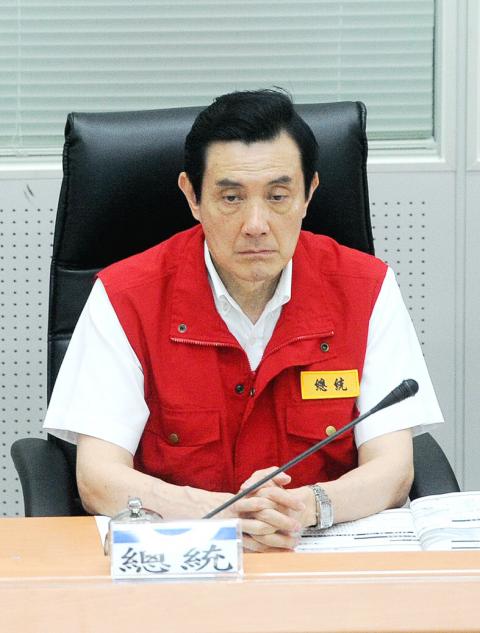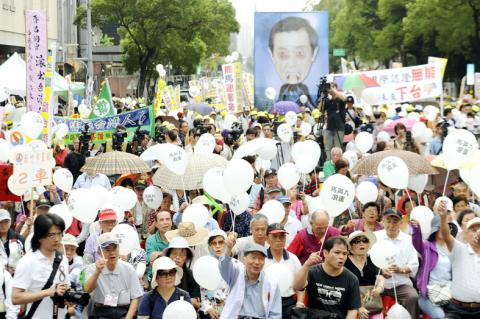|
Put country back on
track: DPP to Ma
TIME AND PLACE: The DPP said that though the
president deserved to be recalled, this was not the right time to do so given
the row with Manila over the death of a fisherman
Staff reporter

President Ma Ying-jeou listens to
a weather report at the Central Emergency Operation Center in Taipei yesterday.
Photo: Wang Min-wei, Taipei Times

Taiwan Solidarity Union
supporters mark the anniversary of President Ma Ying-jeou’s inauguration by
staging a protest in Taipei yesterday as part of their campaign to recall him.
Photo: Chen Chih-chu, Taipei Times
The Democratic Progressive Party (DPP)
yesterday urged President Ma Ying-jeou (馬英九) to steer the nation back in the
right direction — the anniversary of first and Ma’s second-term inaugurations —
but said that now is not the right time to impeach him.
“While we think Ma deserves to be recalled, now is not the right time to do so
because the country is embroiled in a diplomatic row with the Philippines,” DPP
Chairman Su Tseng-chang (蘇貞昌) told a press conference, referring to Taipei’s
engagement with Manila over the shooting of Taiwanese fisherman Hung Shih-cheng
(洪石成) by Philippine Coast Guard personnel on May 9.
The DPP said that the diplomatic tussle with the Philippines was why it was not
supporting the Taiwan Solidarity Union (TSU) in the latter’s proposal to impeach
the president, as it did last year.
Reviewing Ma’s performance over the past five years, the DPP said the nation has
been a chaos under his rule and submitted an appeal listing eight issues Ma
should tackle in the remaining three years of his term.
The party urged Ma to halt the construction of the controversial Fourth Nuclear
Power Plant in New Taipei City’s (新北市) Gongliao District (貢寮) and hold a
national referendum on the plant.
The president should also conduct a comprehensive review of Taiwan’s economic
situation and structure before putting forward a long-term recovery plan to
improve national competitiveness, Su said.
The DPP also called for the establishment of a 12-year compulsory education
system, the formulation of a sustainable and fair pension system and the
implementation of a 10-year long-term care program — a national program
initiated by the former DPP administration that was shelved after Ma took office
— to look after the needs of the nation’s aging population.
It was also imperative to review the nation’s administrative partitioning and
national planning since the number of special municipalities would increase to
six next year from the original two in 2010, meaning that new issues in areas
such as local finances would likely emerge, Su said.
Finally, the DPP demanded that Ma fight corruption, reform the judicial system
and bolster defense and foreign policy.
Former DPP chairperson Tsai Ing-wen (蔡英文) said on her Facebook page yesterday
that Ma’s seemingly ambitious reform efforts were “fast-food” reforms that only
touch upon the surface of a problem without going into the core of the matter.
Tsai urged Ma to listen to the public as he completes his term and tackle
Taiwan’s structural challenges from a long-term perspective.
Meanwhile, the TSU told protesters at a rally in front of the Legislative Yuan
in Taipei that it would submit a legislative proposal to recall the president
for his poor governance during the past five years.
TSU Chairman Huang Kun-huei (黃昆輝) said the TSU launched a recall petition a year
ago that has collected about 830,000 signatures.
“With only three legislators, the TSU caucus is small, but it is confident it
will winn support from the public and lawmakers from other parties,” Huang told
hundreds of protesters amid the honking of car horns by taxi drivers to show
their support of the rally.
A DPP-TSU joint motion to impeach Ma was voted off the agenda by the
legislature’s Procedure Committee in May last year, five days before the end of
Ma’s first term.
The Presidential and Vice Presidential Election and Recall Act (總統副總統選舉罷免法)
stipulates that a recall proposal can only be made with the support of at least
one-quarter of the total members of the legislature and can only pass if it gets
the approval of at least two-thirds of all lawmakers.
The act further states that a president or vice president who has not been in
their position for a full year may not be recalled.
The TSU listed 10 reasons for launching a new recall campaign, including Ma’s
failure to deliver on his campaign pledges, his pro-China position, poor
economic and financial performance, failure to fight corruption and oppression
of media freedom under his tenure, among others.
TSU Secretary-General Lin Chih-chia (林志嘉) said the party has also launched an
online petition and hoped to collect 1 million signatures by next month.
In related news, DPP spokesperson Lin Chun-hsien (林俊憲) said the government must
hold its officials — in particular Minister of Finance Chang Sheng-ford (張盛和) —
responsible for the capital gains tax on securities transactions accountable for
their the hasty and flawed implementation of the policy.
The Ma administration and the Chinese Nationalist Party (KMT) ignored the DPP’s
proposal and insisted on adopting the KMT’s “inferior” initiative, which
introduced a 8,500-point threshold on the TAIEX for the tax to be implemented,
Lin said.
“Less than five months after the tax proposal was passed, the administration is
now considering revising the regulations again. Someone has to be held
accountable for this mess,” Lin said.
Separately, DPP members said that Ma had fallen asleep during a press conference
at the Central Disaster Emergency Operation Center to oversee state
flood-prevention efforts, adding that the nap had been caught on film.
|
![]()
![]()
![]()